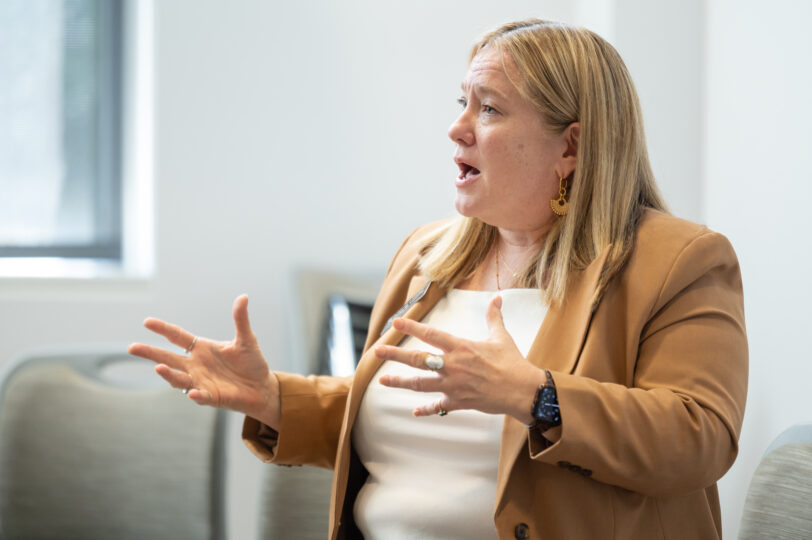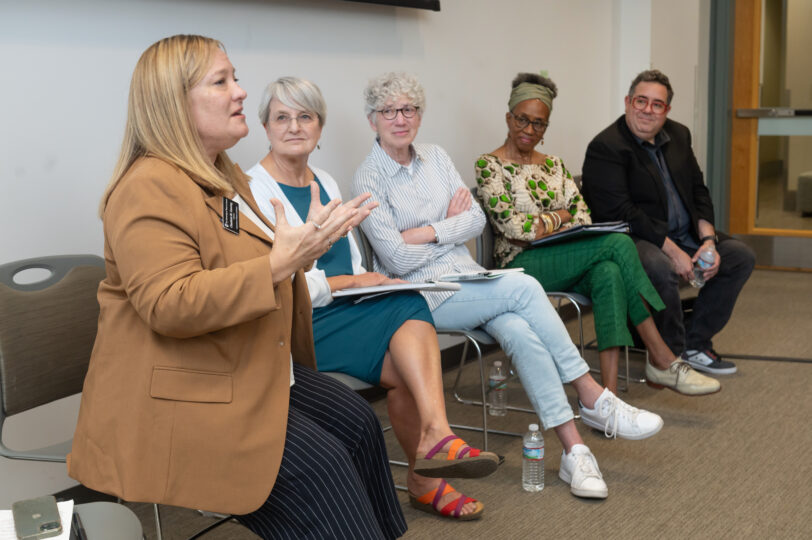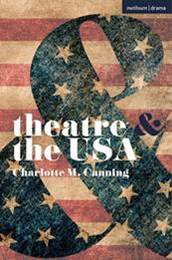Dr. Charlotte M. Canning began her time at The University of Texas at Austin (UT Austin) helping to develop the Performance as Public Practice program in the Department of Theatre and Dance; a program in which she now serves as a professor. From her first book, Feminist Theaters in the USA: Staging Womens’ Experience in 1996 to her 2016 Joe A. Callaway Prize winning book, Canning is also an active historian and author in addition to her many roles as part of the University. Previously serving as the chair of Faculty Council at UT Austin, she continues to serve as the head of the Oscar G. Brockett Center for Theatre History and Criticism, most recently adding the roles of Special Consultant to the Vice President for Student Affairs on Faculty Relations and Secretary to General Faculty to her list of duties. We recently sat down with Canning to discuss additions to the many hats she wears here at UT Austin, as well as her most recent book: Theatre & the USA.
Could you talk a little bit about what you specialize in as a historian and scholar?
Dr. Charlotte M. Canning: As I prepared for my spring 2024 undergraduate seminar “Performing U.S. Origin Stories,” I found myself reading these words over and over again: “like other formerly living things, echoes of the past remain, leaving their traces in the people and events of the present and the future” (32). This haunting observation is from On Juneteenth (2021) by the terrific historian Annette Gordon-Reed, wh o writes trenchantly and lovingly about growing up a Texan (if you haven’t read it, you should!). My work as a performance historian of the U.S. is always trying to understand how the traces of the past inspire and delimit the present and future. I want to understand the past as it actually happened so I can understand why the present is the way it is, and how the future might be. The subjects I focus on to address these questions are diverse and varied—feminist theatre, Circuit Chautauqua, performance infrastructure, internationalism and Texas—but I am always guided by the need to understand how the past is present.
o writes trenchantly and lovingly about growing up a Texan (if you haven’t read it, you should!). My work as a performance historian of the U.S. is always trying to understand how the traces of the past inspire and delimit the present and future. I want to understand the past as it actually happened so I can understand why the present is the way it is, and how the future might be. The subjects I focus on to address these questions are diverse and varied—feminist theatre, Circuit Chautauqua, performance infrastructure, internationalism and Texas—but I am always guided by the need to understand how the past is present.
Tell us about your most recent book, Theatre & the USA. Why do you think theatrical performances are a significant tool to understanding the nation’s history?
Canning: In the book, I quote the Frenchman Alexis de Tocqueville, whose extensive travels across the USA in the early 1830s resulted in what would become a classic work of sociology and political philosophy. Democracy in America (1835) has an entire chapter on theatre and de Tocqueville emphasized that no form “is more closely or more abundantly linked to the present state of society than the theatre” (567). Theatre no longer dominates the entertainment industry, that position long seized first by radio and movies, then television and more recently the internet. It is still staple, however, of communities, schools, churches, commercial institutions and still very much a part of the entertainment industry. The history of theatre in the USA explains much about the nation’s construction and investments.
Talk about the other roles you’ve taken on at the University. How do you juggle these roles while teaching and maintaining your work as a writer and scholar?
Canning: I have always believed that being a faculty member, especially a tenured full professor, comes with a great deal of responsibility. That we all take on our fair share of governance and committee assignments should be non-negotiable. Besides, when I interviewed the artists for my dissertation (which became my first book, Feminist Theaters in the USA: Staging Womens’ Experience), they all emphasized that they created feminist theatre because they didn’t see the theatre they wanted and made it themselves. I took that to heart. I want to see the arts and humanities represented in all parts of the University and have to do my part to make that a reality. It is rarely easy to bring all my different roles together seamlessly, but it is why I am passionately committed to being in a university: all of us are asked to push the boundaries of what exists with the ultimate goal of new knowledge.

What is your favorite thing about teaching at UT Austin?
Canning: Easiest question ever: the students! They are smart, dedicated and question everything. I love that I never have to worry that a class won’t be challenging for me as well as them because they never fail to bring all they have to every class session. There is nothing like a room full of UT students to keep you on your toes! Whenever I think about UT, what always stands out in my mind is the brilliance and creativity of the students.
View Dr. Charlotte M. Canning’s full bio HERE.
Written by Mackenzie Mann.


